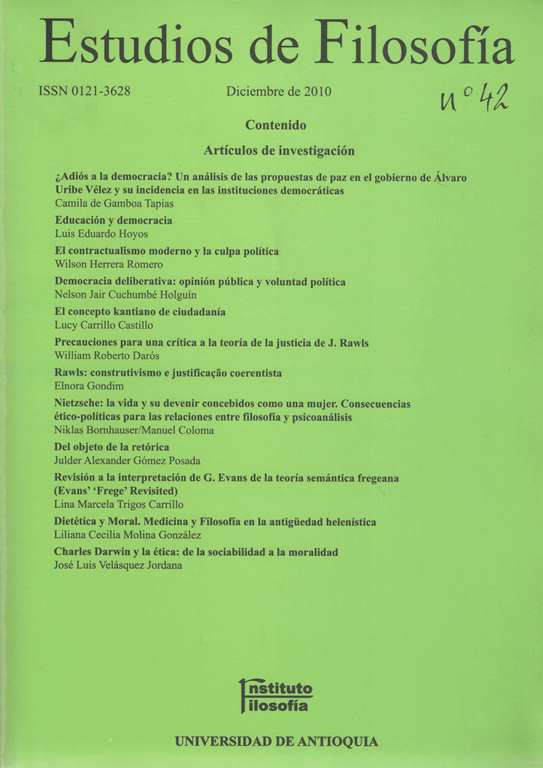Revision of G. Evans' interpretation of Fregean Semantic Theory (Evan's 'Frege' Revisited)
DOI:
https://doi.org/10.17533/udea.ef.11589Keywords:
Semantics, Meaning (sinn), reference (bedeutung), meaning, Fregean Semantic Theory, Compositionality Principle, Context PrincipleAbstract
The first chapter of The Varieties of Reference by Gareth Evans, called ‘Frege’, opens the doors to new perspectives for the analysis of Fregean Theory. This paper aims to revisit Evans’ interpretation of Fregean Semantic Theory, to analyze some of the consequences derived from such interpretation, and to propose a version of Fregean Semantic Theory that can account for the problematic cases in the analysis of a Natural Language. This paper is divided in two major parts: in the first eight minor parts, Evans´ argument is reconstructed and analyzed; and in its conclusions, there is an analysis of the conclusions reached by Evans bearing on his argument and there is a proposal to make compatible the Compositionality Principle and the Context Principle in the Fregean frame with the intention of solving conflictive cases for a Fregean Semantic Theory of Natural Language.
Downloads
References
Cummins, R. (1989). Interpretational Semantics. En R. Cummins, Meaning and Mental Representation (págs. 87-113). Cambridge: The MIT Press.
Dummet, M. (1996). Frege and Husserl on Reference. En M. DOI: https://doi.org/10.1093/0198236212.003.0010
Dummet, The Seas of Language (págs. 224-229). Oxford: Clarendon Press.
Evans, G. (1982). Frege. En J. McDowell (Ed.), The Varieties of Reference (págs. 8-41). Oxford: Clarendon Press.
Frege, G. (1996). Función y concepto. En G. Frege, Escritos filosóficos (págs. 147-171). Barcelona: Grijalbo Mondadori.
Frege, G. (1996). Sobre concepto y objeto. En G. Frege, Escritos filosóficos (págs. 207-222). Barcelona: Grijalbo Mondadori.
Frege, G. (1996). Sobre sentido y referencia. En G. Frege, Escritos filosóficos (págs. 172-197). Barcelona: Grijalbo Modadori.
Frege, G. (1892 [Reprinted in 1952]). Über Sinn und Bedeutung. Zeitschrift für Philosophische Kritik , 100, 40-65.
Grush, R. (1999). Frege. En R. Grush, Rick Grush’s Guide to Gareth Evans’ The Varieties of Reference (págs. 2-14). San Diego: UC.
Recanati, F. (2004). Literal Meaning. Cambridge: Cambridge University Press. DOI: https://doi.org/10.1017/CBO9780511615382
Sainsbury, M. (2001). Logical Forms (2a ed.). Oxford: Blackwell.
Downloads
Published
How to Cite
Issue
Section
Categories
License
Copyright (c) 2010 Estudios de Filosofía

This work is licensed under a Creative Commons Attribution-NonCommercial-ShareAlike 4.0 International License.
Authors who publish with this journal agree to the following terms:
1. The Author retains copyright in the Work, where the term "Work" shall include all digital objects that may result in subsequent electronic publication or distribution.
2. Upon acceptance of the Work, the author shall grant to the Publisher the right of first publication of the Work.
3. The Author shall grant to the Publisher a nonexclusive perpetual right and license to publish, archive, and make accessible the Work in whole or in part in all forms of media now or hereafter known under a Creative Commons Attribution-NoCommercia-ShareAlike (CC BY-NC-SA 4.0), or its equivalent, which, for the avoidance of doubt, allows others to copy, distribute, and transmit the Work under the following conditions: (a) Attribution: Other users must attribute the Work in the manner specified by the author as indicated on the journal Web site;(b) Noncommercial: Other users (including Publisher) may not use this Work for commercial purposes;
4. The Author is able to enter into separate, additional contractual arrangements for the nonexclusive distribution of the journal's published version of the Work (e.g., post it to an institutional repository or publish it in a book), as long as there is provided in the document an acknowledgement of its initial publication in this journal;
5. Authors are permitted, and Estudios de Filosofía promotes, to post online the preprint manuscript of the Work in institutional repositories or on their Websites prior to and during the submission process, as it can lead to productive exchanges, as well as earlier and greater citation of published work (see The Effect of Open Access). Any such posting made before acceptance and publication of the Work is expected be updated upon publication to include a reference to the Estudios de Filosofía's assigned URL to the Article and its final published version in Estudios de Filosofía.















